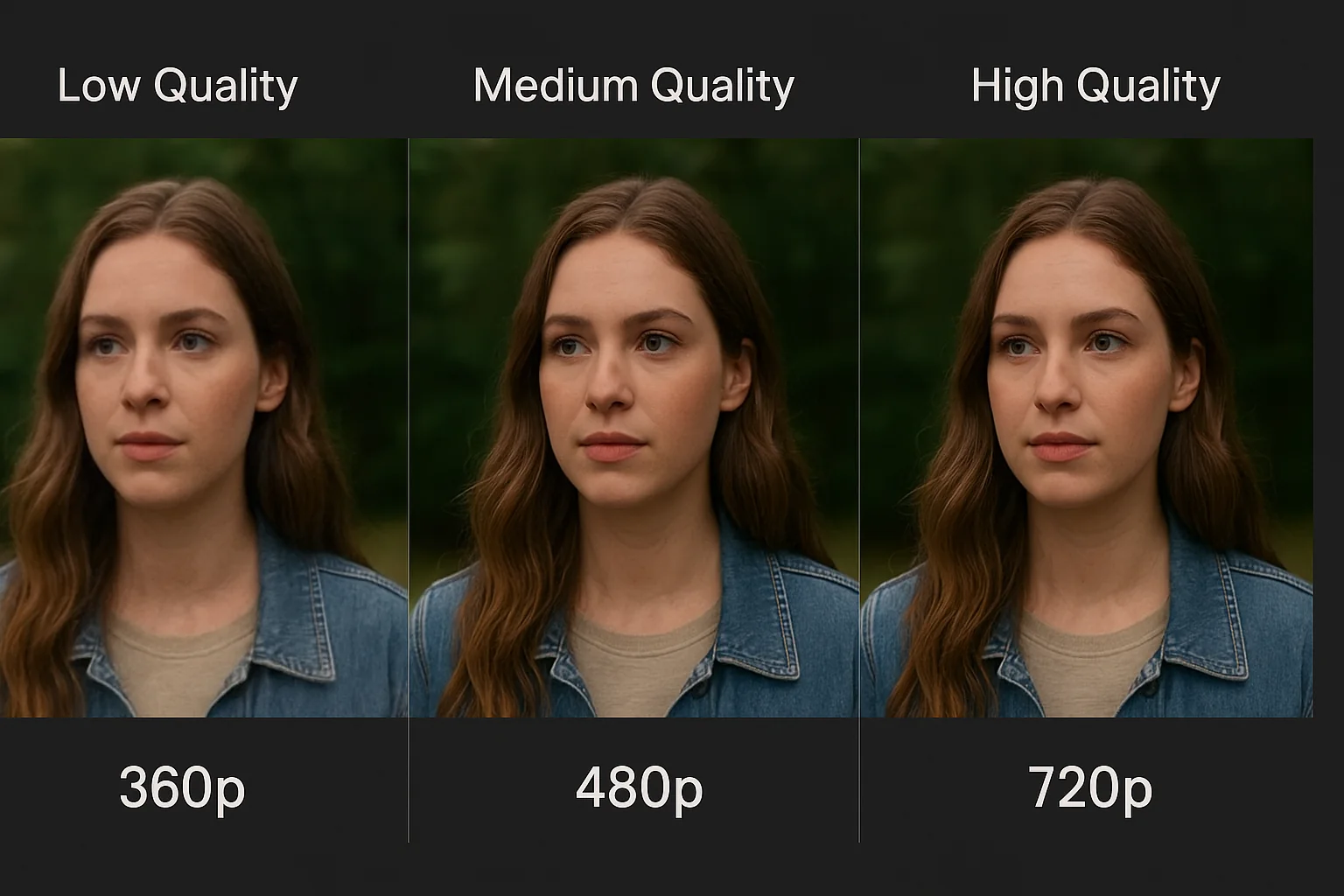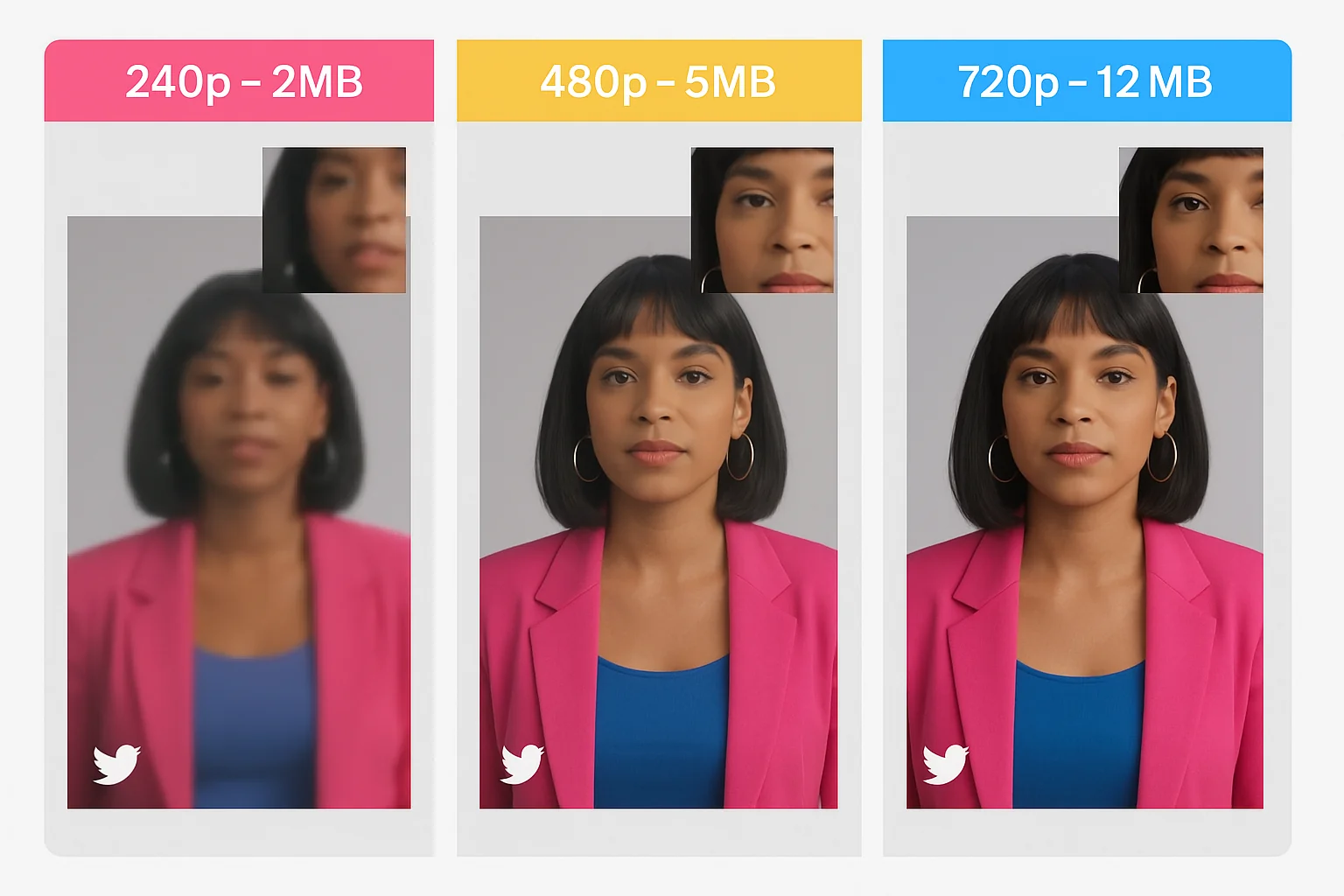Introduction
When downloading Twitter videos, quality matters – whether you're saving content for personal viewing, professional use, or creative projects. However, many users struggle with finding the right balance between video quality and file size. This guide will help you understand Twitter video quality options and how to optimize your downloads for the best possible results.
Understanding Twitter Video Quality Factors
Before diving into optimization tips, it's important to understand the key factors that affect Twitter video quality:
Resolution
Pixel dimensions (e.g., 720p, 1080p). Higher resolution means more detail but also larger files. Twitter typically limits resolution to 720p for most content.
Bitrate
Amount of data per second of video. Higher bitrate results in better quality but larger files. Twitter applies compression that reduces bitrate.
Frame Rate
Images displayed per second (e.g., 30fps). Higher frame rate creates smoother motion but increases file size. Most Twitter videos are 30fps.
Compression
How video data is reduced for storage/streaming. More compression creates smaller files but lower quality. Twitter uses aggressive compression.
How Twitter Handles Video Quality
Twitter processes videos in ways that affect the quality you can download:
Twitter's Video Processing
- Automatic Transcoding: Twitter converts uploaded videos into multiple quality versions
- Adaptive Streaming: Different quality levels are served based on connection speed
- Resolution Caps: Twitter limits maximum resolution (typically 720p for most content)
- Compression: Twitter applies compression to reduce bandwidth usage
5 Practical Tips for Optimizing Twitter Video Downloads
Always Check Available Quality Options
When using MediaFetcher or other download tools, check all available quality options before downloading. Don't automatically select the first option, as it might not be the highest quality.
Look for "Source" or "Best Quality" Options
Some download tools offer a "Source" or "Original" quality option, which attempts to download the highest quality version available. This is usually the best choice if file size isn't a concern.
Consider Your Usage Needs
Choose quality based on how you'll use the video. Higher quality is better for editing or professional use, while medium quality may be sufficient for casual viewing.
| Usage | Recommended Quality |
|---|---|
| Casual viewing on mobile | Medium (480p) |
| Viewing on larger screens | High (720p) |
| Professional use/editing | Highest available |
| Archiving important content | Highest available |
| Limited storage space | Medium (480p) |
Check File Format Options
Some download tools offer different format options like MP4, WebM, or MOV. For most cases, MP4 offers the best balance of quality and compatibility.
Why MP4 is Usually the Best Choice
Universal Compatibility
Plays on virtually all devices and platforms without conversion
Good Compression
Provides reasonable file sizes without significant quality loss
Editing Friendly
Widely supported by video editing software for further processing
Download During Off-Peak Hours
Network congestion can sometimes affect download quality. For important videos, try downloading during off-peak hours when Twitter's servers may be less busy.
Advanced Quality Optimization Techniques
For users who need the absolute best quality or have specific requirements, these advanced techniques can help:
After downloading, you can use video enhancement software to improve quality:
- Video upscaling software can increase resolution
- Color correction tools can enhance visual appeal
- Noise reduction filters can improve clarity
- Frame interpolation can make motion smoother
Popular options include Adobe Premiere Pro, DaVinci Resolve (free version available), or Topaz Video Enhance AI for more advanced AI-powered enhancement.
Some video formats preserve quality better than others:
Free tools like HandBrake or FFmpeg can handle these conversions with minimal quality loss.
When downloading multiple Twitter videos:
Create Quality Presets
Define standard quality settings for different types of content to ensure consistency
Automate Workflows
Use tools like FFmpeg scripts to process multiple videos with the same settings
Organize by Quality
Create folder structures to organize videos by quality level and content type
Common Video Quality Issues and Solutions
Even with the best download practices, you might encounter quality issues. Here are solutions to common problems:
Problem: Downloaded Video Appears Pixelated
Possible Causes:
- Original video was low quality
- Selected a low-quality download option
- Video contains fast motion scenes
Solutions:
- Try downloading again at highest quality option
- Check if better quality versions exist
- For important videos, consider AI-based upscaling
Note: Even the best available version might show pixelation during high-motion scenes due to Twitter's compression algorithms.
Problem: Audio Quality Issues
Possible Causes:
- Original audio was poor quality
- Audio-video synchronization issues
- Audio compression artifacts
Solutions:
- Try alternative download tools that prioritize audio quality
- Consider using audio enhancement software
- For serious issues, extract and process audio separately
Note: MediaFetcher automatically selects the highest quality audio stream available when downloading.
Problem: Video Stutters or Drops Frames
Possible Causes:
- Interrupted download
- Player compatibility issues
- Original video has frame rate issues
Solutions:
- Re-download the video on a stable connection
- Try different video players (VLC often handles problematic videos well)
- Consider converting to a more compatible format
Note: For professional use, consider using frame interpolation software to smooth out problematic videos.
Why MediaFetcher Offers Optimal Quality Downloads
MediaFetcher is designed to help you get the best possible quality from Twitter videos:

Conclusion
Getting the best possible quality when downloading Twitter videos requires understanding both Twitter's video processing and making informed choices during download. By following the tips and techniques in this guide, you can ensure you're getting the highest quality downloads possible for your specific needs.
MediaFetcher provides an optimal balance of quality, convenience, and reliability for Twitter video downloads, making it an excellent choice for anyone who values video quality.
Frequently Asked Questions
What's the highest quality I can download from Twitter?
Twitter typically caps video resolution at 720p for most users, though some verified accounts or Twitter Blue subscribers may have access to 1080p uploads. You can never download a higher quality than what was originally uploaded.
Why does my downloaded video look worse than when streaming on Twitter?
This could happen if you selected a lower quality download option or if the download was interrupted. Always select the highest quality option and ensure you have a stable internet connection during downloads.
Can I improve video quality after downloading?
Yes, using video enhancement software can improve the appearance of downloaded Twitter videos. Tools like Adobe Premiere Pro, DaVinci Resolve, or specific AI-based upscalers can enhance quality, though they can't create detail that wasn't in the original.
Do different download tools affect video quality?
Yes. Some download tools may not access the highest quality versions or might apply additional compression. MediaFetcher is designed to identify and download the highest quality version available without additional processing.
